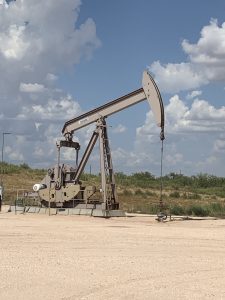
What Does Coronavirus Have to Do with Oil & Gas Workers? Oil Prices Have Dropped 20% Because of Falling Demand that Many Blame on Coronavirus and that Means More Pressure by Some Unscrupulous Operators to Improperly Deny Overtime
The domestic oil industry is hurting. Low oil prices have hurt almost everyone in the oil and gas sector. Companies just aren’t making profits. For reputable companies, that means declaring losses or deferring capital projects. A few companies, however, try to balance their books on the backs of employees.
The very people responsible for the success of the company are the ones squeezed when the going gets tough. When we say getting squeezed, we don’t mean deferring raises or putting bonuses on hold. We mean wage theft; not paying employees premium pay for hours worked in excess of 40 per 7 day period.
Unionized workers may get some help from their locals but what about the average Joe working a rig, driving a truck or installing pipelines? Congress passed the Fair Labor Standards Act (FLSA) back in the 1930’s to protect workers.
The latest threat to the oil industry is the coronavirus epidemic. Worldwide oil prices are down 20%. As this post is being written, crude prices are hovering just over $50 per barrel. And that means even more financial pressure on struggling companies.
Overtime Laws and Oil & Gas Workers
The Fair Labor Standards Act protects energy industry workers from:
- Unpaid Overtime (premium pay is required after 40 hours / week)
- Unpaid Wages
- Receiving Less Than Minimum Wage
- Missed Meals and Breaks
- Misclassification (Companies avoid OT by misclassifying workers as contractors)
- Misclassification (Telling workers they are exempt when they are not)
- Not Getting Paid for Working Through Lunch, Taking Work Home, Fielding Work Calls on Personal Time, Prep Work, Uniform Changing, etc.
Many state laws also offer protection for workers. States such as California may calculate overtime for those working more than a specified of hours each day.
We often see oil and gas companies attempting to skirt the law by claiming workers are “independent contractors.” Others tell workers they are not eligible for overtime because they are “exempt”, salaried or professionals. Simply because your boss says you are exempt doesn’t mean it’s true.
Earlier this week the Wall Street Journal reported that because of a slump in prices caused by coronavirus, “some already struggling energy companies may not ne able to weather the drop in oil and gas demand.” The paper reports that there were 37 oil and gas bankruptcies in the last three quarters of 2019 compared to just 15 during the same period in 2018.
In 2016, the U.S. Department of Labor reported that there was a high rate of noncompliance with overtime laws within the oil and gas industry. DOL’s Southwest U.S. wage and hour division chief, Betty Campbell said,
“We continue to find unacceptably high numbers of violations in the oil and gas industry. We must ensure that employers pay workers the hard-earned wages they have rightfully earned. Employers who violate the law in their pay practices harm workers, their families and law-abiding industry employers. These cases demonstrate our commitments to ensuring workers are paid a fair day’s pay for a fair day’s work.”
That year the feds went after three Texas oil industry companies, Investigations of Jet Specialties Inc., of Boerne; Frank’s International LLC and Stream-Flo USA LLC, of Houston; and Viking Onshore Drilling LLC, of Odessa.
In 2019, Ardent Companies, a subcontractor for ExxonMobil and freeport McMoRan, agreed to pay $2.3 million to settle allegations that workers on offshore platforms were always on duty because they could not easily leave before the end of their rotation. The money was shared by 102 workers.
In a currently pending case, KRH, Inc is being sued by a flowback operator. He says that he is required to work 7, 12 hour shifts for a total of 84 hours in a week but doesn’t receive premium pay. The company claims it doesn’t have to pay because workers are independent contractors.
FLSA, Overtime and Oil Workers
We doubt there will be any direct cases of workers not getting paid because of coronavirus. With margins so tight, however, the 20% crash in oil prices attributable to the outbreak may be enough to push some companies into cheating their workers.
With crude prices down, employees must remain very vigilant to any attempts to shortchange their paychecks. The law only allows workers to go back 2 years (in some instances 3 years). Each day you wait to take action may mean a day of lost overtime pay.
We certainly encourage companies to pay what they owe, even if it is painful. In 2015, eight workers (frac hands, grease hands, and crane operators) from Oil States Energy Services opted out of a class action and took their individual overtime claims to court. After a two week jury trial, the court ordered to pay the workers between $54,292 to $178,388 for a total of $1,003,154. Because the law also contains an attorneys’ fee provision, the company had to pay an additional $2,263,904 for the worker’s legal fees and reasonable costs of litigation of $118,826. This doesn’t include the millions they probably paid their own lawyers.
If your employer isn’t properly paying premium pay for overtime hours or is not paying for all hours worked, you may have a claim under the Fair Labor Standards Act and state law for monetary damages. Because the law provides for legal fees, there is no worry about the need to front fees or costs.
To learn more, visit our oil and gas workers overtime page as well as our FLSA overtime claims page. Ready to see if you have a claim? Start the process online or contact us by email brian@mahanylaw.com or by phone at 202.800.9791. Cases handled nationwide. All inquiries are confidential and without obligation.
The post Coronavirus: Oil Field Workers Beware (Overtime Post) appeared first on Mahany Law.